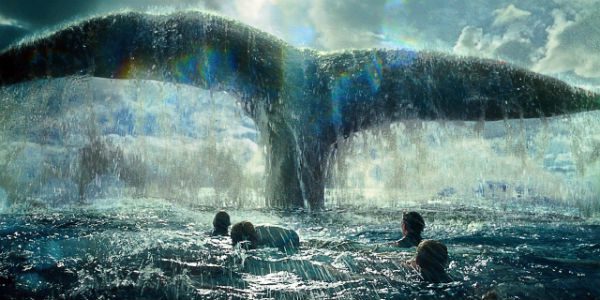One of the grace notes in Peter Weir’s masterful 2003 film “Master and Commander: The Far Side of the World” was its casual, occasional yet accurate insertion of faith into the story of a brash British ship Capt. Jack Aubrey (Russell Crowe) of the HMS Surprise, hot on the trail of a dreaded privateer during the Napoleonic Wars.
There are prayers recited, and it’s obvious that most of the crew is familiar with Bible stories, but oddly, my favorite line is also a bit blasphemous.
At a point where the ship is becalmed, Aubrey declares in frustration, “I can harness the wind, but I ain’t its g–damn creator.”
Aubrey’s likely not an orthodox Christian, but he’s a man who knows his place in the scheme of things. Unfortunately, that element is lacking in director Ron Howard’s handsome production of the whaling drama “In the Heart of the Sea,” which comes out in theaters on Friday, Dec. 11.
It’s based on Nathaniel Philbrick’s nonfiction account of the sinking of the Nantucket-based whaler Essex in 1820, reportedly after an attack by a mighty sperm whale, which ultimately inspired Herman Melville’s “Moby Dick.”
In the movie — which, although all the characters are Americans, features only one American actor in a major role — Melville (Ben Whishaw) visits aging Tom Nickerson (Brendan Gleeson), who was a cabin boy on the Essex.
In one long night, Nickerson relates the saga of the ship’s demise, including the tragic lengths to which the sailors had to resort (not shown in any graphic detail) to survive after their ship was sunk, and they were set adrift in small whaling boats.
Also, and this was a bit of a surprise, the movie is free of moralizing about whaling, save for an acknowledgement of how quickly the whale supply was running thin. After all, no one went whaling because he hated the animal but to obtain the precious oil that lit lamps and city streets. As one character observes, “We’re in the oil business.”
The sight of tiny men setting forth in dinghies to face off with creatures the size of buses, armed only with muscle and harpoons, can be difficult to watch for anyone who loves whales. But the courage and fortitude of the whalers — who are only seeking to make a living for themselves and their families in a world with no safety nets — is undeniable.
The relentless attack of the angry sperm whale after a whale cow with a calf is harpooned can be seen as a sort of revenge of nature against man, but the point isn’t belabored. There is a scene where the Essex’s unlucky captain, George Pollard Jr. (Benjamin Walker, the lone leading Yank), tells his rival, First Mate Owen Chase (Chris Hemsworth), that man is the supreme creature and has dominion over the Earth, but the two are in such desperate straits at the moment that it just comes off as irony.
Only occasional reference to prayer is seen, even though overt religiosity was very common in the early 19th century, especially among men who pitted themselves against a pitiless sea.
I saw the movie in 3-D, and it’s quite a visual spectacle seen that way. The cinematography and effects are top-notch, and the acting is perfectly fine, if in service of a script that doesn’t take the talented cast to the emotional places of which they’re capable.
Not having read Philbrick’s book — although, now I really want to — I can’t say what role faith plays in his work, drawn from accounts penned by Nickerson and Chase. What is known is that Nantucket’s whaling industry was run by Quakers, who eschewed war with other humans but had no qualms about going to war with the sea’s largest creatures.
In the end, the discovery of oil in the ground — and the thinning of the sperm whale population — spelled doom for the whaling industry. Japan still hunts whales, for “scientific research” and meat, but there is nothing a whale provides now that can’t be obtained another way.
While “In the Heart of the Sea” earns its PG-13 rating — not for excessive profanity or sex, but for intense sequences of action and danger — it’s an imperfect but impressive look at male rivalry, brotherhood and courage, similar in that way to Howard’s “Apollo 13.”
At the same time, the guts and fortitude of women, while not a large part of the movie, is not ignored.
Despite the current horror at the thought of whaling, it’s always useful for young people to realize the incredible feats of bravery, determination and sacrifice that it took for earlier generations to survive.
After watching college-age people wilt like hothouse orchids in the face of “trigger” words and unpopular opinions, to see a teen cabin boy like Nickerson endure unimaginable privation and still survive with his dignity intact is worth the price of admission.
Then, go home and order up “Master and Commander,” which offers much the same thrills with deeper and more developed characters.
Here’s a peek at “In the Heart of the Sea”:
Images: Warner Bros. Pictures
Don’t miss a thing: head over to my other home at CatholicVote and like my Facebook page.














